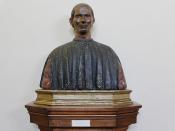The Prince: A Summary
This paper summarizes the germinal leadership book, The Prince by Machiavelli. After a brief summary, the paper will discuss the importance of the book to leadership and the lessons that can be applied to educational leadership.
Summary
The Prince begins with an overview of the two types of Princedoms which are, according to Machiavelli (1513/1992), hereditary or new (p. 1). Hereditary Princedoms are those that are passed down through many generations. New Princedoms can be blended into hereditary Princedoms; these are usually geographically close to the hereditary Princedom and its people generally speak the same language. New Princedoms can also be wholly new and are often obtained via a hostile means; in many cases, the new Princedom's people are of a different language and culture.
To be successful running and keeping control of a mixed or wholly new Princedom, the leader must consider several factors.
The method by which the Prince came into leadership may be cruel or heroic. New laws and institutions may be introduced; for this the Prince must decide whether to live in the new Princedom or set up colonies to maintain rule. A third alternative is destruction, "for in truth, there is no sure way of holding other than by destroying, and whoever becomes master of a City accustomed to live in freedom and does not destroy it, may reckon on being destroyed by it" (Machiavelli, 1513, p. 11). The book presents all three alternatives in the form of examples of leaders both historic and his contemporaries.
Next, the book turns to a discussion of potential threats to power. Machiavelli asserts that the Prince must remain powerful and always be wary of powerful outsiders who might try to unseat him. He says, "that some such person will be called in by...


